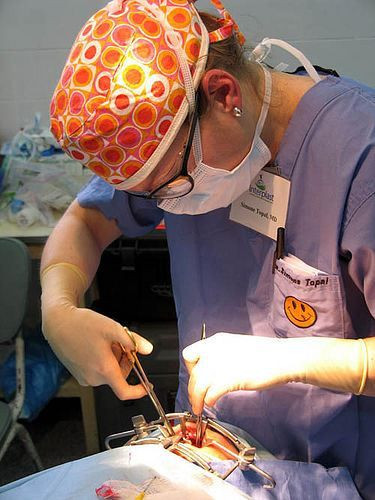HIV Restrictions On Health Care Workers Uplifted In UK: Infected Doctors, Dentists Can Now Perform All Tasks Including Surgery

The U.K. announced that it will be removing restrictions on HIV-infected health care workers, allowing physicians, nurses, dentists and midwives to take part in all tasks, as it is well-known today that HIV is highly difficult to transmit from health care workers to patients.
England’s chief medical officer, Dame Sally Davies, announced that a lot of the rules about HIV limitations had been put in place back in the 1980s and 1990s, and that they were “outdated.”
She said that there was no reason to “hold back some of our best healthcare workers because of a risk that is more remote than being struck by lightning."
According to the BBC, there have been four total cases of health workers infecting patients with HIV. All four of these health workers were not on anti-retroviral drugs at the time.
Meanwhile, the CDC states that there have been 57 documented examples of health care workers being infected with HIV through their interaction with HIV-infected patients.
For those who are on drugs for the virus, the likelihood of transmitting HIV is negligible. With the new rules, healthcare workers will be able to partake in all tasks, including dentistry and surgery, as long as they are on anti-retroviral therapy, are regularly monitored, and have an undetectable level of the HIV virus.
After the introduction of highly active antiretroviral therapy (HAART) in the last decade, the quality of life of those infected with AIDS has vastly improved. HIV infection is no longer a “death sentence,” and people with HIV can be expected to live long and healthy lives, as HAART treatment pushes levels of the virus so low, that it is nearly undetectable in their systems (though never fully eradicated). The treatment has been widely hailed as a medical success story, though the history and process of the development of the treatment was long and complicated.
However, despite these improvements in the past decade, the stigma still remains. Davies noted that societal attitudes toward the disease in the 1980s might have “stuck in the public memory,” and that it is something that will need to change. “I worry that the public has not caught up with the reality of HIV treatment,” she said.
Before the recent removal of restrictions, doctors, nurses and midwives with HIV were unable to perform surgery or treatments if their hands or fingers were at all visible, due to the risk of there being a cut on their skin. Several HIV-infected dentists had to completely give up their careers due to these restrictions.
The UK was one of the last countries to catch up on HIV healthcare worker regulation. About four more countries still impose these restrictions on infected healthcare workers.
In the U.S., the American Medical Association’s Guidance for HIV-Infected Physicians and Other Health Care Workers (2011) states: “As a general rule or until there is scientific information to the contrary, the HIV-infected health care worker should be permitted to provide health care services as long as there is no significant risk of patient infection.” It also states that an HIV-infected physician or health care worker should refrain from “exposure-prone procedures,” though the guidelines also aim to protect HIV-infected physicians from discrimination or breach of confidentiality.
Sir Nick Partridge, chief executive at Terrence Higgins Trust, told the BBC: "Advances in medication have transformed what it means to live with HIV, and it's great to see regulations starting to catch up."
Published by Medicaldaily.com



























